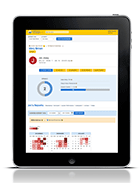

Main navigation | Main content
Researchers have found the following with regard to the Student Engagement Instrument:
Early warning systems use school record data— such as attendance rate, behavior records, and course performance—to identify students at risk of dropping out. These are useful predictors of graduation-related outcomes, in large part because they indicate a student's level of engagement with school. However, these data do not indicate how invested students are in education—information that could help school counselors and other staff understand and intervene when students are falling off the path to graduation. To examine whether student engagement surveys have additional predictive value beyond data readily available in school databases, we followed a cohort of students, who completed a survey of cognitive/affective engagement as ninth graders, to one year beyond their expected high school graduation. Some engagement factors measured by the survey met rigorous tests of predictive value in terms of identifying which students were falling off the graduation path, even when controlling for other powerful predictors of the outcome (Lovelace et al. 2018Lovelace, M. D., Reschly, A. L. & Appleton, J. J. (2018). Beyond School Records: The Value of Cognitive and Affective Engagement in Predicting Dropout and On-Time Graduation. Professional School Counseling, 21, 70-84. DOI: 10.5330/1096-2409-21.1.70). Tip: hover to view the full citation and all references.
This study evaluated the psychometric properties of the Student Engagement Instrument–College version (SEI–C) with college students in the southeastern United States. Participants self-selected paper-and-pencil or online administration. Confirmatory factor analysis revealed a modified 5-factor structure. Measurement invariance of the modified 5-factor structure of the SEI–C was assessed across the paper-and-pencil and online samples. Full configural, full metric, partial scalar, and full residual variance invariance This study evaluated the psychometric properties of the Student Engagement Instrument–College version (SEI–C) with college students in the southeastern United States. Participants self-selected paper-and-pencil or online administration. Confirmatory factor analysis revealed a modified 5-factor structure. Measurement invariance of the modified 5-factor structure of the SEI–C was assessed across the paper-and-pencil and online samples. Full configural, full metric, partial scalar, and full residual variance invariance were established. The paper-and-pencil and online data were aggregated, and correlational analyses between the 5 SEI–C factors and the 4 higher order factors of the Motivation and Engagement Scale–University/College (MES–UC) provided evidence of convergent and divergent validity. All but 1 of the 20 correlations were statistically significant, and all correlations were in the expected direction. Overall, there is evidence to suggest the appropriateness of extending the SEI upward for use with college students and for collecting data via online or paper-and-pencil administration (Waldrop et al. 2019Waldrop, D., Reschly, A. L., Fraysier, K., & Appleton, J. J. (2019). Measuring the engagement of college students: Administration format, structure, and validity of the Student Engagement Instrument-College. Measurement and Evaluation in Counseling and Development, 52, 90-107. DOI: 10.1080/07481756.2018.1497429). Tip: hover to view the full citation.
Wright, A.G., Reschly, A.L., & Hyson, D. M. (2019, February 26). Measuring student engagement in early elementary school. Presentation at the annual meeting of the National Association of School Psychologists, Atlanta, GA.
O’Donnell, K., Reschly, A. L., Lovelace, M., & Appleton, J. (2018, February). Longitudinal profiles of student engagement: Predicting graduation and college attendance. Presentation at the annual meeting of the National Association of School Psychologists. Chicago, IL.
Fraysier, K., Reschly, A.L., & Appleton, J.J. (2016, February). Predicting Postsecondary Enrollment and Persistence with Secondary Student Engagement Data. Presentation at the annual meeting of the National Association of School Psychologists. New Orleans, LA.
Pinzone, C., Appleton, J.J., & Reschly, A.L. (2014). Longitudinal measurement invariance analyses of the Student Engagement Instrument Brief. Presentation at the annual meeting of the National Association of School Psychologists. Washington, DC.
 For those implementing Check & Connect, the C&C App replaces paper/pencil monitoring forms and reporting systems.
For those implementing Check & Connect, the C&C App replaces paper/pencil monitoring forms and reporting systems.  Preview and order this comprehensive guide to implementing Check & Connect. Bulk discounts available.
Preview and order this comprehensive guide to implementing Check & Connect. Bulk discounts available.